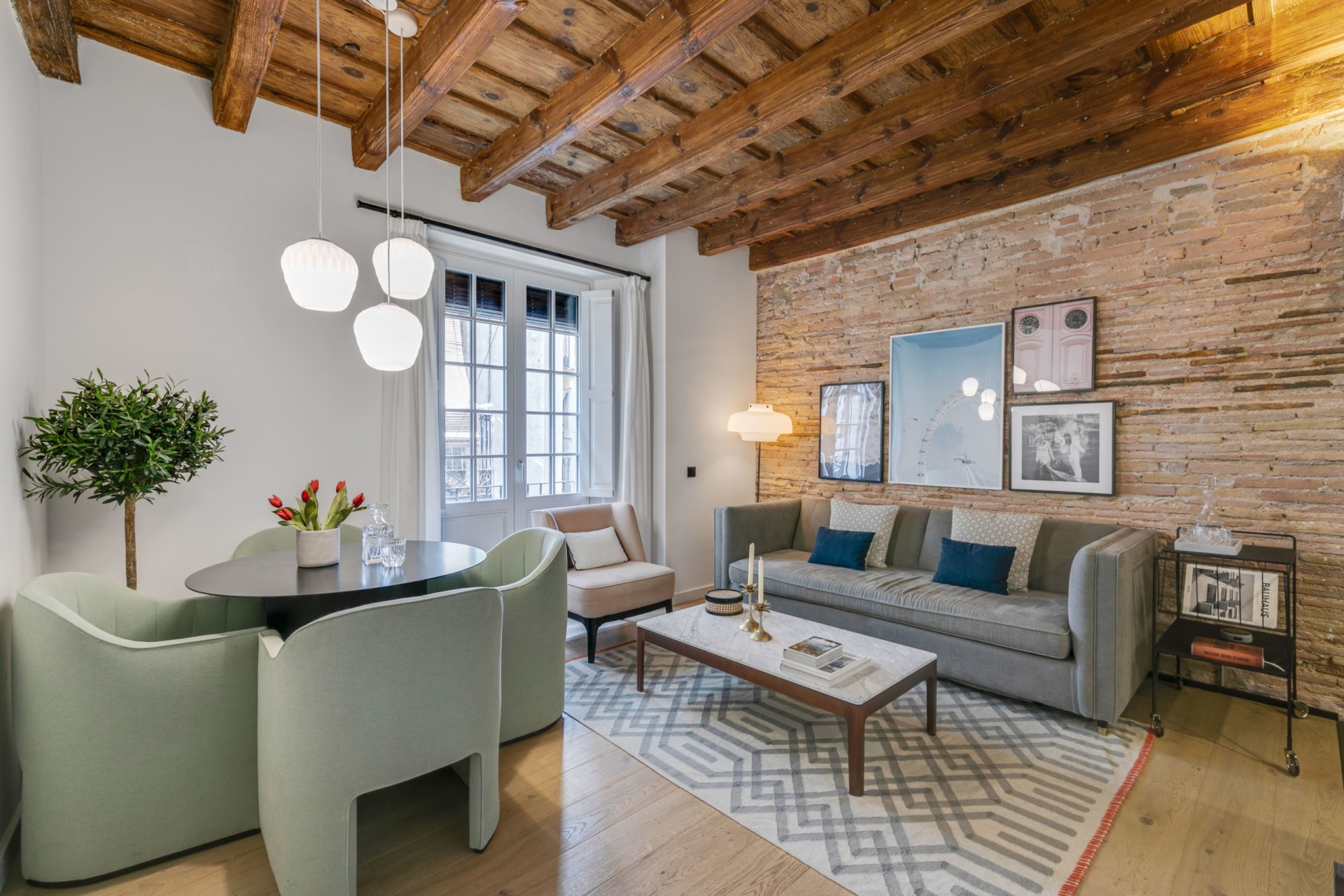Lorem ipsum dolor sit amet consectetur. morbi facilisis maecenas tempor
porttitor eget eu morbi sed pellentesque interdum.





30 March 2021
Mª Luz Morales was born in A Coruña in 1889. She was the first woman in Spain to run a national general information newspaper, La Vanguardia.
Her family moved to Barcelona when she was just a child and although she never lost touch with her Galician roots, she lived in Barcelona for the rest of her life.
Beginnings can always difficult, but at the young age of twenty, she won a writing competition which had been organised by the magazine El Hogar y la Moda (Home and Fashion). This opened the doors for her to journalism, allowing her to begin working as an editor. Three years later, in 1923, she would become head editor of the publication.
Her university education in philosophy and letters, which at that time was rare among women, enabled her to establish herself as a recognised professional. With a defined vocation, she began to write articles for various magazines such as Lecturas and Films Selectos.
As a native speaker of Spanish, Catalan and Galician, she was also fluent in several foreign languages such as English, French and Portuguese, this enabled her to excel in translating and adapting texts.
In the mid-1920s, Mª Luz joined the editorial department of La Vanguardia. The prestigious newspaper, after following her work, took an interest in the young columnist and offered her the chance to collaborate with them by writing articles on fashion and women's issues.
The feminine content of her articles revealed a new approach, a good entrepreneur knows she must bring something new to the table. She offered a different point of view from that of other publications of the time.
Soon, her writing would also cover other content and she soon specialised in film reviews, which she would write under the pseudonym of Felipe Centeno.
As a film expert, she attracted the attention of Paramount, the American production company.
The firm's managers were impressed to discover a young woman behind the identity of Felipe Centeno. Thanks to her great professionalism, this did not prevent her from being hired to work at Paramount Magazine.

A Tireless traveller
In 1928, Mª Luz joined the Barcelona Journalists' Association and became a professional journalist.
During the 1930s, she also collaborated in various publications such as the newspaper El Sol, sharing pages with Ortega y Gasset and Marañón, among other intellectuals.
On her regular professional trips to Madrid, the journalist stayed at the Residencia para Señoritas; there she met outstanding women such as Marie Curie and Gabriela Mistral.
In 1931, aside from her current job, she also presided over the International Residence for Young Female Students in Barcelona and the Lyceum Club. This new responsibility demonstrated her concern for young women’s education and training.
These were not the only trips made by the journalist. She would return to her native Galicia with the wish to maintain her connections to her homeland; to achieve this, she made contributions in the Galician language.
At the outbreak of the Civil War, the authorities seized La Vanguardia, the CNT-UGT occupied its offices and dismissed its chief editor. Fellow editors and correspondents wholeheartedly supported Mª Luz's appointment as chief editor of the paper.
The journalist set a precedent in history as an enterprising woman and, just like Caterina Llull Sabastida, would lead the way for future women to become entrepreneurs and find professional success.
“Let someone else take care of the politics, I'll focus on journalism”. This was the first of the two premises that Mª Luz imposed in order to accept the responsibility entrusted to her. The second: that her appointment must be provisional.
Equanimity, tolerance and honesty were the staples of the newspaper under her leadership. Her success earned her the nickname of “Great Lady of the Press” from her colleagues.
However, her apolitical stance did not keep her out of trouble. In 1939, like many journalists, she was dismissed and imprisoned. After her release, she continued to write under the pseudonyms of Ariel and Jorge Marineda.
In 1940, she was denounced for her time as chief editor of La Vanguardia and was imprisoned once more, this time in a convent of nuns in the city of Barcelona which had been converted into a prison.
Certain of wanting to return to journalism, in 1949 she began publishing articles on theatre in the Diario de Barcelona.
She was a tireless worker. Dedicating long days to the dissemination of culture, she wrote, translated texts and adapted film scripts into Spanish. Her hard-working vocation also led her to write plays and novels.
Mª Luz also focused on children's literature, adapting classic works of literature which were published by the publishing house that she herself directed, Ediciones Araluce.
During her long career, she won several awards and recognitions, both for her journalistic and cultural work. The writer and director of the Observatorio Cultural de Género, Mª Ángeles Cabré, described her as a pioneer in professional cultural journalism in Spain.
An expert in the seventh art who also contributed her grain of sand to the genre. In 1958, her novel El amor empieza en sábado (Love starts on a Saturday) was made into a film, directed by Victorio Aguado Candela.
In her role as an anthologist, she published in 1970 Libro de Oro de la poesía en lengua castellana (Golden Book of Poetry in Spanish Poetry). Her legacy to the reader is extensive and varied, Mª Luz left us a literary inheritance of great value.

“I will never stop writing because I need it as much as I need to breathe". Mª Luz perfectly summarises her career as she would never stop writing until the day she died, at the age of 91 in Barcelona, 1980.
For women who work in the world of journalism, the figure of Mª Luz Morales Godoy is an example of a professional who knew how to combine her charisma and talent with daily effort and work.
In an interview with La Vanguardia in 1972, she said: “Neither feminism nor masculism. Only men and women, people, as God made us".
Don't you think it is evident to the reader that professionals of pen and paper have the responsibility to write while feeling free?
Maybe that idea is also part of Mª Luz Morales Godoy's legacy.


ES
Lorem ipsum dolor sit amet consectetur. morbi facilisis maecenas tempor
porttitor eget eu morbi sed pellentesque interdum.
Mail: residents@caterina.house
Telefono: +34 931 222 465
Red: CaterinaHouse
Contraseña: feelslikehome

No está permitido fumar dentro del edificio.
No se pueden dejar las llaves en la parte interior de la cerradura o perderlas. Se cargarán 150€ por la pérdida de ésta.
No se pueden pegar o colgar cosas en las paredes. Cualquier daño puede conllevar una penalización.
No se pueden hacer ruidos molestos e el edificio ni en el apartamento entre las 22 y las 8 de la mañana.
Invitar a personas sin previo aviso (máximo 2 personas).
No se pueden colgar toallas o prendas de vestir en los balcones. utiliza la secadora o el tendedero.
No se pueden hacer fiestas en el apartamento o en la azotea de tu edificio..
Infórmanos sobre cualquier daño. Incluyendo ropa de cama, toallas o la pérdida de la llave o tarjeta
Apaga el aire condicionado cuando no lo utilices. Así podremos evitar problemas de mantenimiento.
El horario de entrada comienza a las 15 hs. y se prolonga hasta las 19 hs. Puedes realizar self check-in en cualquier momento de manera gratuita.
Limpia la cafetera después de cada uso. De ésta manera podremos garantizar el buen funcionamiento de ésta.
Asegúrate que la puerta de tu apartamento y la puerta proncipal queden cerradas correctamente cada vez que sales o entras el edificio.
La hora de salida debe ser antes de las 11:00 hs. Sólo tienes que dejar las llaves sobre la mesa y cerrar la puerta tras de ti. Asegúrate de que todos los aparatos electrónicos, la luz y el aire estén desconectados para cuidar el planeta y las instalaciones.

¿Quieres pedir un paquete pero no sabes qué dirección
de entrega poner porque no estarás en casa?
¿Te sientes confuso con los electrodomésticos y todos esos botones te dejan hecho un lío? ¡Hay una solución sencilla! Pulsa el botón de los manuales de instrucciones que aparecen a continuación y tendrás más información sobre nuestros electrodomésticos. En caso de tener cualquier otra pregunta, no dudes en ponerte en contacto con nosotros.